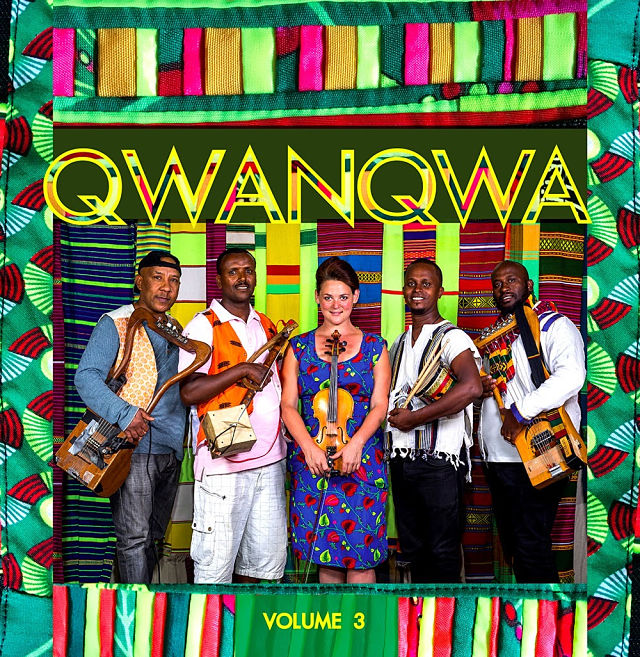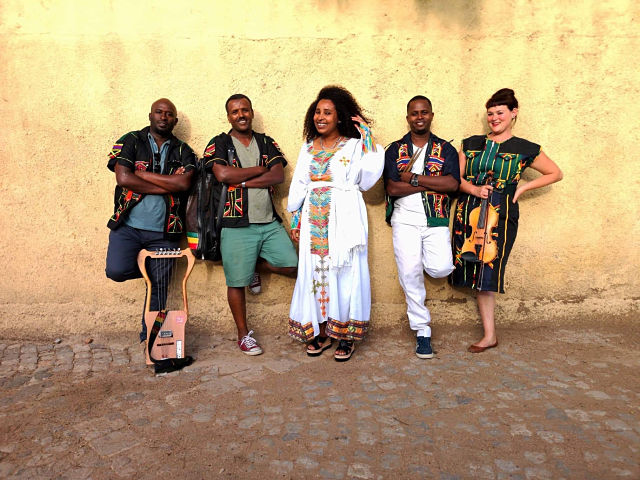 QWANQWA is a five-piece ensemble based in Addis Ababa, dedicated to exploring and furthering Ethiopia’s unique string traditions. The group draws inspiration from the regional sounds of Ethiopia, East Africa, and beyond. (Courtesy Photo)
QWANQWA is a five-piece ensemble based in Addis Ababa, dedicated to exploring and furthering Ethiopia’s unique string traditions. The group draws inspiration from the regional sounds of Ethiopia, East Africa, and beyond. (Courtesy Photo)
Press Release
QWANQWA RETURNS IN 2020 WITH QWANQWA VOLUME 3
QWANQWA is a five-piece ensemble based in Addis Ababa, dedicated to furthering Ethiopia’s unique string traditions. Inspired by a shared passion for Ethiopian music, the group brings together some of the most accomplished traditional players in the country; creating a space to explore new sounds and break the rules in a very traditional musical culture.
Since their 2012 debut, QWANQWA has merged the richness and diversity of rooted tradition with a modern, experimental sensibility, inspired improvisation, and a mission to transcend genres and blur boundaries. Their third studio album, Volume 3, will be released internationally on vinyl, CD, and digital platforms on September 11th, 2020, at midnight, just in time for Ethiopian New Years (2013 on the Ethiopian Calendar).
In keeping with the inclusive spirit of QWANQWA’s previous two albums, Volume 3 reaches deep into Ethiopia’s regional traditions and beyond its borders, taking inspiration from the country’s diverse ethnic population and neighbors to the North, West, and East. Recorded in Addis Ababa over the course of a long weekend in February 2017, the album is a snapshot of a dynamic band in evolution.
A long time in the making, QWANQWA Volume 3 features the band’s pre-2018 repertoire and lineup — Endris Hassen on one-string mesenko fiddle, Mesele Asmamaw on vocals and electric krar lyre, Kaethe Hostetter on five string electric violin, Bubu Teklemariam on bass krar, Selamnesh Zemene (vocalist), and Misale Leggesse on kebero.
“The music on this album reflects the repertoire we were working with at the time,” says QWANQWA bandleader Katehe Hostetter. “The material was sourced from regions beyond Ethiopia’s borders, including an Eritrean tribal chant transformed by our arrangement, and a Somali pop song. We were inspired by the infinite musical variety of Ethiopia and its neighbors, and dove deep into the traditions beyond the five most well known ethnic groups. Thanks to our band members’ Endris Hassen and Misale Legesse’s encyclopedic knowledge, we were able to spotlight these tiny pockets of overlooked musical traditions.”
“Since the recording of this album,” Kaethe adds, “Addis Ababa has dipped in and out of a State of Emergency due to ethnic tensions, but we’ve stayed resilient and creative, and our message of one unified Ethiopia, that celebrates and includes all 84 official ethnic groups, has never felt more poignant.”
The first track, “Ago”, welcomes the listener into the evocative world of QWANQWA, with a trio arrangement of a melody from the Northern people, in which you’ll hear the violin evoking the simple Shepard’s flute. “Blen“ is based on an Eritrean melody of the Blen tribe, that’s traditionally accompanied by a circle of dancing young men, dressed in white and spinning like dervishes. “Somali” is a cover of a Dur Dur Band tune, with an extended section where Mesele and Kaethe trade melody and soloing. “Serg” is a 20 minute wedding song medley that is meant to invoke the trance-like experience of an Amhara wedding.
“This album was originally meant to support our Fall 2020 North American tour debut — 48 U.S. dates backed by a grant from the MacArthur Foundation, anchored by a special collaboration with with Tomeka Reid and Chicago’s Hyde Park Jazz Festival. Thanks to COVID-19, our tour is postponed until next year, but the album was still ready to go, so we decided to release anyway. We’re just thrilled to finally see this album out in the world and connect with our fans even if we can’t do it live!”

(QWANQWA, left to right: Bubu Teklemariam, Endris Hassen, Selamnesh Zemene, Misale Legesse, Kaethe Hostetter)
ABOUT QWANQWA
QWANQWA is a five-piece ensemble based in Addis Ababa, dedicated to exploring and furthering Ethiopia’s unique string traditions. The group draws inspiration from the regional sounds of Ethiopia, East Africa, and beyond. Delving deep into traditional beats and moods, QWANQWA’s music is characterized by tight arrangements and inspired improvisation punctuated by extended experimental moments.
“QWANQWA is a project where master instrumentalists can open up and improvise,” says founder Kaethe Hostetter. “It’s about creating a space to explore new sounds and allow players to break the rules in a very traditional musical culture.” The group takes its name from the Amharic word for “language,” is dedicated to creating musical dialogues between cultures, and the proposition that music is the universal language that transcends borders and boundaries.
QWANQWA’s singular sound is built on an array of Ethiopia’s unique traditional instruments: Swirling mesenko, punk krar solos (electric lyre), wah-wah-violin, bass krar boom, and the unstoppable rhythm of heavy kebero beats, punctuated by a Western 5-string electric fiddle. With this lineup and the group’s stunning new vocalist, QWANQWA has enchanted audiences at home and abroad.
The ensemble was founded in 2012 by American violinist Kaethe Hostetter, who first worked in Ethiopian music as a founding member of critically acclaimed Debo Band. Since relocating to Ethiopia’s capital, Addis Ababa, in 2009, she’s honed her sound and dived deep into the culture, playing in numerous exploratory and professional projects. As part of her immersion in Ethiopian music and culture, Hostetter brought together some of the most accomplished players in Addis Ababa’s music scene.
“QWANQWA originally started as a purposefully instrumental ensemble, defiantly the only one of its kind in Addis,” says Kaethe. “We spotlighted the virtuosity of the instrumentalists that often got lost behind the singers. We spent years performing and strengthening as a quartet, until we invited singer Selamnesh Zemene to join as our front woman in 2018. Over the course of eight years of performing and touring, we’ve grown into a tight-knit band, rooted in deep friendship and shared experience, and Selamnesh fit right in, taking us to the next level.”
QWANQWA is Endris Hassen (mesenko), Kaethe Hostetter (violin), Bubu Teklemariam (bass krar), Selamnesh Zemene (vocalist), and Misale Legesse (kebero).
Misale Legesse has been active in Ethiopian music for over twenty years. He was born in Addis Ababa’s Sidist Kilo neighborhood where he started playing percussion as a child – using pails and empty cardboard boxes as his instruments. He honed his skills to become Addis’s go-to percussionist on both conga and the traditional kebero drum. He’s released several original albums, and toured internationally, performing with such legends as Mahmoud Ahmed and Aster Aweke, and joined experimental projects with such partners as The EX and Paal Nilssen-Love.
Endris Hassen is arguably the most sought after masinqo player in Addis. An in-demand studio musician who has guested on over two thousand albums, Endris is also founding member of several key groups, including Fendika, Nile Project, Ethiocolor, Atse Teodros, and more.
Selamnesh Zemene is a powerhouse vocalist and one of Ethiopia’s rising divas. She hails from the Azmari bloodline of griot-like musicians. Selamnesh joined the band as lead vocalist in 2018, just in time for two European tours, where she received much critical acclaim as one of the dual front-women of the group.
Anteneh (Bubu) Teklemariam fell in love with the sound of the kraar at an early age, taking lessons at a local NGO from the age of 16. Soon after he joined his first band, and has been playing ever since — performing on countless recordings with many of the leading Ethiopian traditional bands and Orthodox Koptic Christian artists. A composer as well as a musician, Bubu is a prolific songwriter, whose music and lyrics often contain spiritual and socially conscious messages on environmental issues or Ethiopian identity.
Together these musical adventurers honed a fresh, new sound that’s rooted in centuries old traditions, yet exploratory, open and future-facing. Since their founding in 2012, QWANQWA has emerged as an integral and constant presence in Addis Ababa nightlife scene, and has released two critically-acclaimed albums, Volume One (2014) and Volume Two (2015); with Volume Three due for release in September, 2020.
They’ve taken their sound international, too, rocking audiences on two major European tours with knockout shows at the Roskilde and WOMEX festivals in 2016 and 2017. Members of QWANQWA have also appeared internationally with some of the biggest names in Ethiopian music and beyond: Getachew Mekuria, The EX, Thurston Moore, Fred Frith, Butch Morris, Debo Band, Nile Project, Paal Nilsson-Love, Fendika, Mahmoud Ahmed, Mulatu Astatke, Addis Acoustic, Ethiocolor, Atse Teodros, Mohammed “Jimmy” Mohammed, and Imperial Tiger Orchestra, and have played stages from Lincoln Center to Bonnaroo, Jazzfest (New Orleans), Moers Festival, Roskilde, WOMEX, WOMAD and more.
—
Join the conversation on Twitter and Facebook.

























